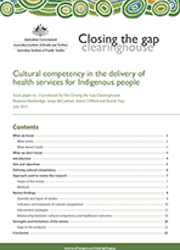Summary
What we know
- Cultural competency is a key strategy for reducing inequalities in healthcare access and improving the quality and effectiveness of care for Indigenous people.
- Cultural competence is more than cultural awareness—it is the set of behaviours, attitudes, and policies that come together to enable a system, agency, or professionals to work effectively in cross-cultural situations.
- Developing and embedding cultural competence in health services requires a sustained focus on knowledge, awareness, behaviour, skills and attitudes at all levels of service, including at the operational or administrative service level, health practitioner level, practitioner-patient level and student-training level.
- In Australia, past efforts to increase levels of cultural competence have been largely designed for particular situations. There has been an absence of a coherent approach to its inclusion or teaching and a lack of national standards for the provision of culturally competent health services.
- Research on cultural competence is overwhelmingly descriptive and there are few evaluation studies that are methodologically strong. In particular, there was a lack of Australian specific evidence about what strategies are most effective for improving culturally competent healthcare delivery to Indigenous Australians.
What works
- The limitations in the evidence base meant that it was not possible to draw definitive conclusions about the effectiveness of culturally competent practices and frameworks in providing health care benefits for Indigenous people. But there was both international and Australian evidence of its potential in a number of studies.
- There were some studies that found that bringing together the cultures of health care organisations with Indigenous communities can improve access to health care for Indigenous Australians. This process involves health care organisations:
- consulting with Indigenous Australian health services and communities
- tailoring service delivery to the needs and preferences of specific communities
- embedding cultural competence within the health care organisational culture, governance, policies and programs.
- Education for health care students that incorporates cultural perspectives and experiences can improve health students’ preparedness for working in Indigenous health and their future commitment to working for change.
- It can lead to more open attitudes, increased awareness, more effective advocacy, a preparedness to engage with Indigenous people, and a better understanding of Indigenous health issues.
- Field experience can also make an important and positive contribution to health students’ perspectives.
- Several studies suggested that key to reducing health disparities for Indigenous populations was health care workers developing partnerships, eliminating bias through self-reflection, and building relationships with Indigenous people.
- Embedding cultural competency principles within legislation or policy (as has been done in the United States and New Zealand) is a strategy that could be useful across Australia’s health systems as part of an ongoing commitment to Indigenous Australians and delivering culturally competent care.
- Internationally validated instruments that measure health service access and use, service quality, perceived discrimination, language barriers and trust of practitioners could be useful if tailored to Indigenous Australian health services.
What doesn’t work
- Cultural awareness training is not enough in itself.
- While such training might be expected to impart knowledge upon which behavioural change will develop, it has generally not been enough when it is delivered in isolation or rapidly delivered over short timeframes.
- Program transfer and implementation without cultural-tailoring are ineffective.
- There are no homogenous approaches to developing and implementing cultural competence.
- Cultural competency programs that are successful in one context cannot be assumed to work in another.
- Programs need to be developed and delivered in partnership with and input from local Indigenous people.
What we don’t know
- There is neither a clear definition nor consistent terminology around cultural competence.
- There is inconclusive evidence on the effectiveness of culturally competent interventions and frameworks in relation to health care access and outcomes for Indigenous Australians.
- More needs to be done using validated indicators to measure what works in efforts to develop culturally competent health services for Indigenous Australians.
- More work is also required to determine the best combination of strategies to improve cultural competence in healthcare.
What we know
What we don’t know
Introduction
Aim and objectives
Defining cultural competency
Approach used to review the evidence
Review findings
Strengths and limitations of the review
Conclusion
Appendix A: Nomenclature around cultural competency
Appendix B: Original search
Appendix C: Updated search
Appendix D: Indicators of cultural competence ordered in terms of the strength of indicator quality
Appendix E: Evaluated cultural competency interventions ordered in terms of strength of design quality
Appendix F: Nature of healthcare outcomes ordered in terms of weight of evidence
End matter: Acknowledgments; Terminology; Funding; Suggested citation; Copyright



